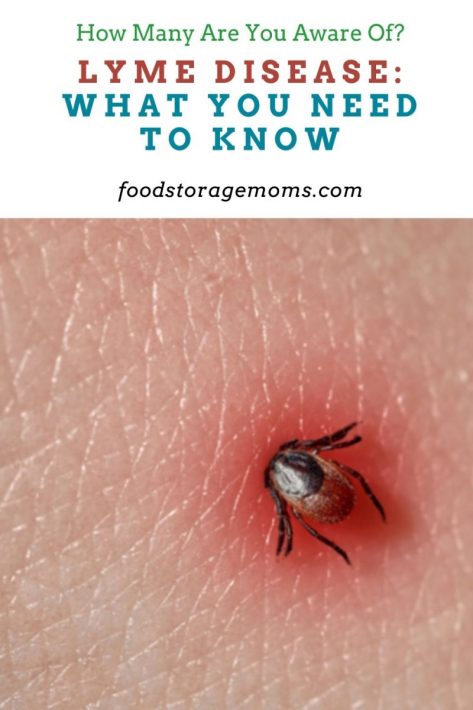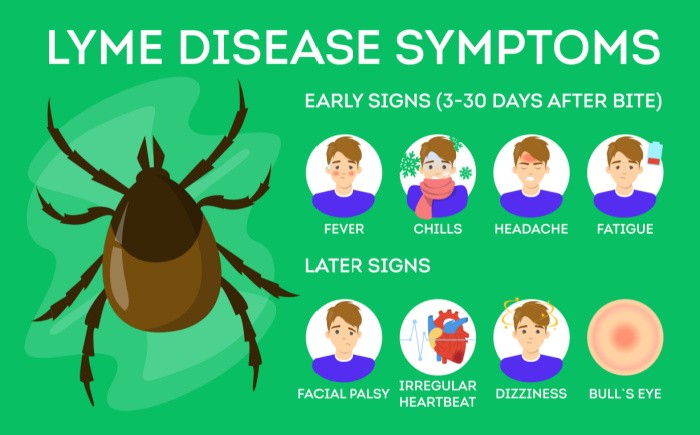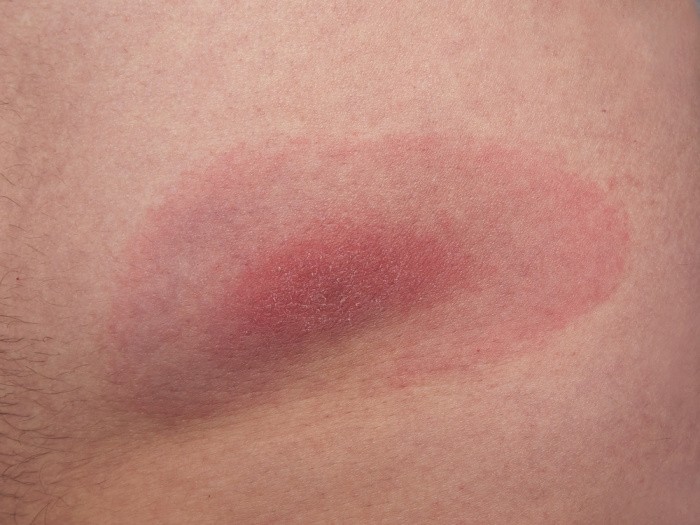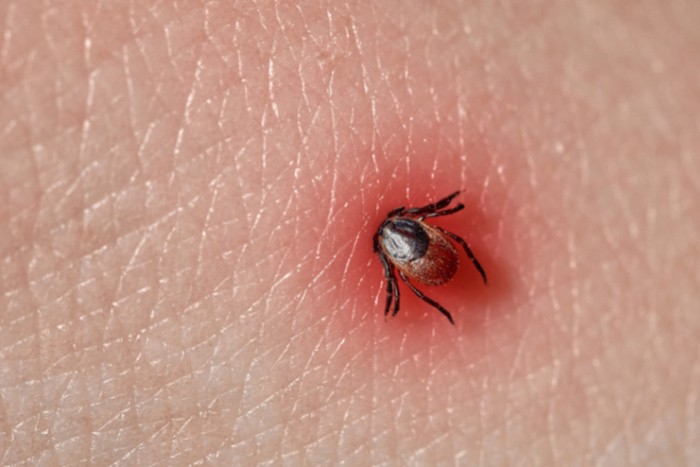Lyme Disease: What You Need to Know
Lyme disease is an illness that occurs after an individual gets a deer tick bite. Many ticks carry this bacteria that can quickly spread to humans through bites. While it’s one of the most common diseases in the United States, there is still a lot of information that the average person doesn’t know about the disease. If you have Lyme disease, or would just like to learn more about it, continue reading!
In case you are not aware of the book I was asked to write, check out this link to learn more: “Prepare Your Family For Survival” by Linda Loosli
Lyme Disease: What You Need to Know

How Long Does the Disease Last?
Many people wonder if Lyme disease is a condition they’ll have for the rest of their lives. After receiving the diagnosis, it typically takes a minimum of two weeks for an individual to feel better with no recurring side effects associated with the disease. However, it can take up to four weeks or longer. Although it’s not as common, some people continue to experience Lyme disease symptoms for months.
The Common Symptoms of Lyme Disease

Not everyone who is affected realizes they have Lyme disease at first. However, they may experience specific symptoms and think they’re overly tired or coming down with a cold. It’s common for those with the disease to experience a rash on their body. Sometimes, the rash leaves a pattern on the body that looks a lot like a bull’s eye. In addition, the disease can leave you with aching joints, weak limbs, and a fever.

Because the symptoms are similar to the common cold, some people brush it off and assume they’re coming down with a cold. When the symptoms continue to get worse despite using cold and flu medication, it’s usually then that the individual receives the diagnosis upon visiting their physician for treatment.
The Treatment Options for Lyme Disease
Once a patient gets diagnosed with this disease, the physician prescribes antibiotics for the patient to take. The individual with Lyme disease needs to follow the instructions on the bottle of antibiotics, taking them until they no longer have any left. The antibiotics work to kill the bacteria that can cause those uncomfortable symptoms. In some cases, patients may need additional medications, such as anti-inflammatory drugs. The medications prescribed vary from one patient to the next and often depend on the severity of the disease in that specific patient.
Those living with symptoms long after the tick bite may need to see different specialists for treatment. Some of these specialists include rheumatologists, neurologists, and infectious disease doctors. These medical professionals will ask specific questions and run tests to better understand why some patients experience lasting symptoms of the disease and others don’t.
How Long Does It Take to Recover from Persistent Symptoms?
Those with persistent symptoms may wonder when those symptoms will come to an end. Feeling better is a top priority. While there isn’t an exact number of weeks or months, most people with lasting symptoms start to feel better slowly but surely within a few months. It can take up to a year or longer for others. It’s vital for anyone with lasting symptoms to talk to their primary care physician about what they’re experiencing. The physician may provide recommendations or referrals to specialists for additional treatment to help the patient overcome these uncomfortable, and often longer-lasting, and debilitating side effects.
How Do You Get Bitten by a Deer Tick?
It’s easy to get bitten by a deer tick without initially realizing it. These tiny insects blend in with their surroundings and are usually in grassy, humid areas. If you live in a place where the weather is often warm and humid, you have a greater chance of sustaining a tick bite, but that doesn’t mean you’ll end up with a bite. These insects spend a lot of time crawling through shrubs, trees, and other plants, making it difficult to spot them.
Be aware of your surroundings whenever you’re outdoors, especially if you’re walking on a hiking trail or hanging out in a grassy area with your pet. Always check yourself and any pets for any ticks after you’ve been out in the wild. Unfortunately, ticks don’t discriminate, and they can latch on to pets just like they’d latch on to humans.
Because they blend in so well and are relatively small insects, most people don’t notice them when they bite. Deer ticks don’t have a specific area of the body that they typically bite, so they can end up latching on a person’s legs, back, or thigh in an area that is difficult to see without standing in front of a mirror. Those who’ve contracted Lyme disease often have a tick latched to them for more than 24 hours before realizing it. When removed quickly and carefully, it’s often easier to avoid the disease associated with these bites. If appropriate, you may want to have someone else examine your body looking for ticks, particularly in areas hard for you to see on your own.
How to Avoid Tick Bites

If you’d like to avoid tick bites to potentially lower your risk of suffering from Lyme disease, take these preventative measures:
- First, once you’ve spent time outdoors, be sure to get in the shower and wash your body, examining all areas for any ticks that might have latched themselves onto your body.
- Next, before going out into the wild, consider using a chemical repellent safe for use on the body to keep ticks and other insects away from you, such as mosquitoes.
- Third, if you’re spending time outside, wear protective clothing that makes it difficult for ticks to get through to your skin. That can include long sleeve shirts, long pants, to the knee socks, etc.
- Finally, don’t just check yourself after spending a few hours outside. Be sure to check your children and your pets for any ticks, too.
Final Word
Unfortunately, if a deer tick latches onto a person and stays there for a longer period of time, it can cause Lyme disease to develop. The disease often leaves people feeling like they’ve come down with the common cold, but that isn’t the case. The good news is that this condition is curable, but it can take some time to heal and feel better. Some people heal from it faster than others, with some people experiencing drawn-out symptoms of the disease for months. Knowing the symptoms that Lyme disease can cause you, it’s important to remain proactive when you’re outside in areas that the deer ticks frequent, including grassy spots and bushes. May God Bless this world, Linda
Copyright Images: Lyme Disease Symptoms AdobeStock_281009851 by artinspiring, Lyme Borreliosis from Tick Bite Depositphotos_79395882_s-2019, Tick AdobeStock_269814610 by EvgeniyQW, Female Doctor with Tick AdobeStock_160819572 by andriano_cz






















It’s sure messed up a lot of folks round here. I’ve been lucky so far.
Part of it is we are from the “rub dirt on it” and “suck it up and drive on” crowd and don’t run in every time we sneeze so it gets real bad before we go in.
If ya see that circle growing it’s time to go.
Hi Matt, I am the same way, suck it up and drive on. Not so much rub the dirt on it! LOL! But if people see the bull’s eye get bigger, please go see the doctor. I have heard about how much it’s messed up people on the news. It’s scary! Great comment, Linda
When Jane and I spent a lot of time in the mountains of Colorado we treated our clothes (and skin) with Permethrin. It dosen’t just repel ticks and mosquitoes, it kills them. The directions said only apply it to clothing and not to apply it to you skin but since it doesn’t absorb into your blood like Deet products do we didn’t see the harm in doing so. Thirty years later I’d say it worked and didn’t harm us at all. We had ticks all over our place and were trying to not get Rocky Mountain Spotted Fever. For those of you who live in areas where chiggers are common it kills them too.
Hi Ray, thanks for the tip on the Permethrin! I babysat 60 some odd years ago for someone who got Rocky Mountain Spotted Fever. He almost didn’t make it. It was so scary!! I love hearing your story about not getting ticks, whew! Great comment, Linda
We have a huge deer and deer tick population here. We check every time we bathe. We also check each other. My sister had Lyme disease. She’s better now though.
Hi Deborah, I’m glad to hear your sister is better. It’s crazy stuff from what I hear. Linda
She says she still suffers from the results. It’s been years since she was diagnosed.
Hi Deborah, oh man, this is awful! This is so sad, just from a tick! Crazy!! Linda
Hey Linda, this isn’t about ticks, although I’ve known about Lyme disease for a long while now. What I want to ask is,
how do I get your old posts? My phone has an issue with storage, most of which is because I’ve downloaded a lot of your post on it and now I need to get them to my laptop. Is there a way of doing this, it’s been a couple or three years worth of info that I don’t want to lose. Let me know hun.
Hi Pamela, can you transfer the data to your laptop? You would have to download my posts all over again. I wish there was another way but there isn’t that I know of, hopefully, someone can transfer the data to your laptop. Linda
Then, there are those of us who never even knew they were bitten. After probably several years, the Lyme symptoms began… and got worse. Antibiotics kicked it for a number of years, but also took a huge toll on my body. Chronic Lyme does exist, when the disease lies dormant for a while, then migrates into the blood stream and does damage on the weaker areas of the body. That’s why people have such differing symptoms… the weaker parts of the body are what it attacks. Life is hard. Barbara
Hi Barbara, oh my gosh, I’m so sorry. Please help us understand because I have heard this before. So, did you ever see a tick? Did you see a “bulls-eye”? Did you suspect you had Lyme disease? It sounds like you never knew you were bitten based on your first sentence. Did a doctor finally listen to your symptoms? Did you do your own research? I’m sorry I have so many questions, but Lyme Disease is real, there may be others that do not they were bitten. I’m sorry you have had to suffer for years, my friend. Hugs from Utah, Linda
We are always checking for ticks after an outing. Another type of tick that is causing problems is the Lone Star Tick. this has been becoming a problem more recently. It started down south, but is moving north. It will cause an enzyme that makes you allergic to mammal. This can cause anaphylaxis and hives, among others, such as respiratory problems. My husband contracted it and it can only be found by a blood test. Anything that that is related to mammal, such as beef, pork, lamb, or regular sugars that are refined with bone char and also milk allergy because of cows. We live in the central US so we always watch for deer ticks.
Hi Carla, oh my gosh, so are you saying because of this Lone Star Tick, your husband is now allergic to anything mammal? So he cannot eat meat, or dairy (which is liquid meat) and he cannot have sugar? Oh my gosh, am I understanding this correctly? I love learning so this is why I ask questions. I’m so sorry this happened to your husband!! I’m glad they did a blood test, hugs from Utah! Linda